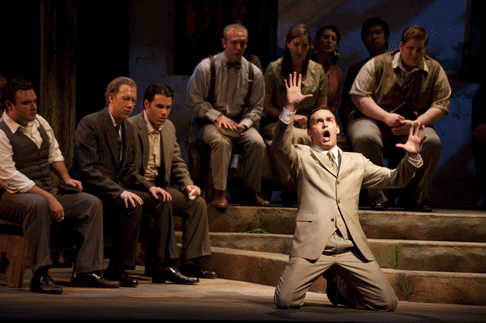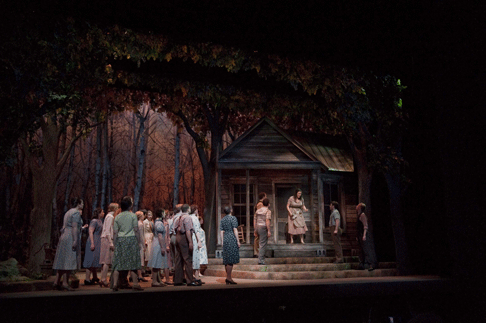27 Apr 2010
Floyd’s Susannah in Boston
Fifty-five years after its premiere, composer and creator reunite for a new production at Boston University

Fifty-five years after its premiere, composer and creator reunite for a new production at Boston University
Susannah is an opera in two acts by American composer Carlisle Floyd, who wrote both the libretto and music. The story is very loosely based upon the story of Susanna and the Elders found in the Apocrypha. In the biblical story, Susannah is found bathing naked by two elders. They threaten to claim she is unchaste unless she agrees to have sex with them. Susannah refuses, is subsequently arrested and about to be put to death, when the prophet Daniel appears and proves her innocent.
Floyd’s version is much darker and leads to tragedy. He updated the story to the mid-twentieth century backwoods of Tennessee. Susannah Polk is an 18-year-old innocent girl who lives with her oft-drunk brother, Sam. When she is discovered innocently bathing naked in the woods by the Church Elders who are looking for a new baptismal site, they and their wives accuse her of being a sinner and pressure Little Bat McLean, her young friend, to lie and say that he was seduced by her. At a revival meeting, Olin Blitch, a traveling preacher, is unsuccessful in getting her to repent. He follows Susannah to her home to continue asking her to repent, but he ends up pressuring her into sex. Now knowing that Susannah was a virgin and that the charges against her are false, Blitch tries to persuade the townspeople to forgive her, but they refuse. Susannah’s brother Sam returns home. After he discovers what has happened, he kills Blitch and runs away. The townspeople try to force Susannah to leave the valley, but, rifle in hand, she drives them off. Only Little Bat remains. Susannah pretends to try to seduce him and then pushes him away.
Susannah premiered at Florida State University in 1955 with Phyllis Curtin in the title role. After many performances in America and abroad, it finally received its Metropolitan Opera premiere in 1999. Today, Susannah is second only to Porgy and Bess as the most performed American opera. It likely has entered the permanent operatic repertory. It is easy to see why. Floyd refers to his works not as operas but as music dramas. Fortunately, Floyd’s talent as a writer is equal to his talent as a composer. The end result is a perfect fusion of word and music that is universal, timeless, powerful and beautiful.
 Adam Canedy as Olin Blitch.
Adam Canedy as Olin Blitch.
In mid-April, Floyd reunited with Curtin to be in residence when Boston University School of Music and School of Theater mounted a new production of Susannah. The two met and worked with students, took part in portions of the rehearsal period, and held pre-show discussions before the first two performances.
Although both are now well into their eighties, age has not diminished their acumen. It was also more than a “do you remember when” experience. Their comments were illuminating with Floyd, in particular, showing himself to be strongly opinionated.
In discussing the gestation period of the opera, Curtin recalled how Floyd had come to her with portions of the partially completed score to ask if she would be willing to sing the part so as to advance possible production of the work.. At that time, Curtin had the more established career. Curtin said that she readily agreed as soon as she saw the music. She also said “I had just finished performing Salome so I knew how to play a bad girl.”
 Act II, Scene 5 - Susannah facing down the mob.
Act II, Scene 5 - Susannah facing down the mob.
Curtin also recalled how, in the late 1950’s, she went to Floyd and asked him to write a concert piece for her. Floyd responded by writing an aria based on a chapter from Emily Bronte’s Wuthering Heights. Curtin said that after the concert at which she sang the aria, the first thing asked was where is the rest of the opera. The end result was that Floyd then had to write the complete opera.
It has long been speculated that Floyd wrote Susannah in response to the McCarthy led witch hunts against communists and subversives in the 1950s — an operatic equivalent of Arthur Miller’s The Crucible. Floyd has always denied this, but in the question and answer sessions preceding the performances he softened his position. While continuing to deny a direct connection, he went on to say that, in writing Susannah, he obviously was subliminally influenced by the climate of fear generated during the McCarthy era. He then spent several minutes describing the reign of terror that descended upon Florida State University during this period, of the campus committees set up there and elsewhere to insure “correctness”, and how even the slightest suspicion was enough to destroy a career.
Floyd also revealed for the first time that he didn’t read the biblical story of Susannah until several years after he completed the opera. He said that he just took the short summary of an idea that a friend proposed as the possible subject for a new opera and went from there entirely on his own.
When asked why he had always written his own libretti, Floyd replied that that was the only was he could assure that he had total control as to the outcome of the work. He also said that writing the libretto was the more difficult part of the process — one that had become even more difficult for him in recent years, as a result of which he was currently not composing.
When questioned as to whether or not he had gone back and re-written any of his operas or if he wanted to, Floyd replied that, with the exception of one opera that was completely re-written for a specific purpose, he had never re-written or desired to re-write any part of his operas. “Why should I?” he said, “I’ve said everything that I want to say before I release a work for performance.” He also quoted Verdi who, during the difficulties he was experiencing in revising Simon Boccanegra, said to the effect that “When you rewrite your work it’s difficult not ending up with a five-legged stool.”
When asked what had surprised him the most since the debut of the work, Floyd referred to the role of Olin Blitch. “When I saw Mack Harrell in the role, I didn’t think that it could ever be played in any other way. I subsequently discovered that the role can be played in many ways.”
When Floyd was questioned as to what advice he would give to sopranos who sing the role of Susannah, he paused for a few seconds before saying “Don’t exhibit any self-pity. So much happens to Susannah during the course of the opera, the audience will fully be with you without your help.”
The Boston University production of Susannah double cast the roles of Susannah and Olin Blitch, with the remaining roles single cast. All are students at B.U. Soprano Chelsea Basler and baritone Adam Cannedy headed the second evening’s cast.
Chelsea Basler was simply superb in the title role. Floyd makes great demands of any soprano singing the role. The music of the opera appears deceptively simple but it is not. At times very lyrical in nature, at other times the brass and woodwinds dominate the music. Consequently, you need a soprano who can not only spin the lyrical lines and pianissimos of “Ain’t It a Pretty Night?” in Act I but also be able to shout down the mob in Act II. Basler met all of the musical demands of the role. She was also a singing actress, effectively portraying Susannah’s journey from the young, free spirit portrayed at the start of Act I to the embittered woman she is turned into by the end of Act II. Particularly noticeable was the intensity with which she approached the role. Her reaction to her persecution was simply heartbreaking.
Adam Cannedy made an effective Olin Blitch, with a sonorous and secure voice. The role was deliberately underplayed, making Blitch a more human figure as against a Burt Lancaster “Elmer Gantry” type. It is difficult to cast young baritones in this type of role as they won’t mature vocally for several more years. Also, in a role that has been defined by such singers as Norman Treigle and Samuel Ramey, putting a young singer in this role is like asking a 26-year-old actor to play Macbeth. Cannedy came close to meeting these challenges.
Clayton Hilley acquitted himself with full honors in the role of Sam, Susannah’s brother. He has a gorgeous tenor voice that was used to full effect. He also was successful in accomplishing the difficult task of portraying a character who is drunk most of the time he is on stage without turning into a caricature. The surprise of the evening was Omar Najmi portraying Little Bat McLean. Only a first year Master’s student at B.U., he gave a very strong, secure vocal performance while at the same time, from an acting standpoint, effectively communicating that Little Bat is mentally challenged.
The Boston University Chamber Orchestra was conducted by William Lumpkin. With thirty-seven members, I don’t know why it is called a “chamber orchestra.” The first performance indicated that the orchestra needed one more rehearsal. The orchestra was in secure form for the second night.
Sharon Daniels, who is Director of Opera Programs and the Opera Institute at Boston University, directed the production. A former soprano who sang the role of Susannah several times including twice with the composer as stage director, she was the one responsible for bringing Floyd and Curtin to B.U. for this production. Under Daniels’ direction, every singer, singing not only in English but in dialect, could be clearly heard and largely understood while on stage. The chorus was not a chorus but a group of townspeople, each not only having its own character but re-acting as to what is going on on stage. Daniels has long had that great ability to portray individuals on stage as real people in natural situations and not as actors or singers performing before the public. Daniels is both a major and unique talent who should be directing in much larger opera venues.
Credit must also be given to the student production team for the success of the performances. Many of today’s scenic designers meet Susannah’s challenge of ten scenes in two acts by giving audiences near empty stages decorated with a few pieces of ribbon and twigs. Scenic designer John Traub instead directly confronted the challenge, creating a natural, woodland glen framing individual sets for each scene while at the same time allowing for the rapid scene changes that today’s audiences, condition by television and film, now demand. He was matched in talent by Costume Designer Elizabeth McLinn and Lighting Designer Mary Ellen Stebbins, the latter providing nuanced lighting that subtly directed the audience’s attention to what was going on on stage without the audience realizing that it was being led.
With the advent of Peter Gelb at the Metropolitan Opera and the series of productions that are being “updated” in New York and elsewhere to great controversy, there has been an increase in discussion as to whether opera or realistic productions of opera has any future in America. If other academic opera centers are performing at or near the level exhibited by Boston University in this endeavor, then opera and realistic opera productions both have a strong future in America.
One last comment. God must have a special love for retired sopranos. Although Phyllis Curtin has now passed four score and eight years, she remains a very beautiful woman.
Raymond Gouin